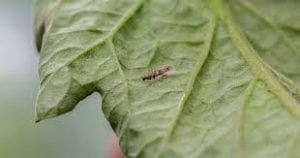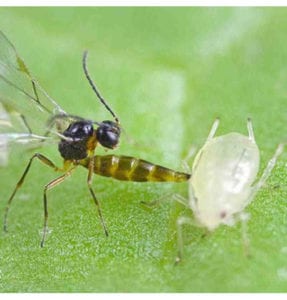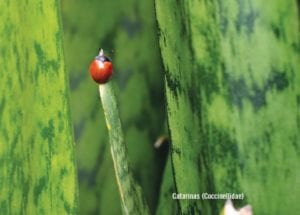Although sometimes insects, like wasps and lacewings, they can become somewhat annoying to us, they are fundamental for the development of human life. They have also become "very good critters" that help farmers. Do you want to know how these act insects against pests and how are they used? Right now we will tell you.
Insects against pests, the perfect alternative to chemical pesticides
In order to obtain XNUMX% healthy, tasty and organic food, it is necessary to fight against the pests of a natural form and not chemistry. This affects the quality of the product, for example in the crops of the tomatoes and aubergines.
In the case of the eggplant its main plague is aphid. And now, to end the problem of pests in that food, farmers are starting to use some types of insects. It is the case of the lacewing, of the so-called Aphidius Ervi (a small parasitoid wasp) and of the hoverflies.

Also, at lacewings (Chrysopidae) they are known as the number one killers of the whitefly. Since they deposit their eggs in the larvae of the same so that as soon as they are born they begin to devour them. The larvae have whiteflies, aphids, mealybugs, mites and small worms in their diet. Flowers are an important element to attract them.
Similarly, for the aphid Macrosipum of the eggplant it is very important to use vegetable extracts without active ingredients harmful to health that also affect these good insects. In addition the larvae Chrysoperla sp. and the wasp braconid Alphidius ervi They already complete this tiny army and finish the cycle of destruction of the plagues.

Tomato lacewing
For tomato, especially in the case of the delicious "cherry", the so-called vasates mite and tomato moth Tuta puro, known by practically everyone who grows this product in the cities of Spain.
Likewise, to take advantage of the latter moth action must be taken on “three levels”. The first with Nesidiocoris to fight against eggs and the smallest larvae, the second with Tricholine (wasps) to parasitize said eggs and, finally, sexual confusion pheromones to prevent their entry and reproduction.

How does it benefit us to use these insects against pests?
Although vegetable extracts and other biodegradable products are a good option to try to kill pests in the most natural way possible, insects are becoming more and more valuable and important in the agricultural world. Thanks to them I know respects the environment and the health of workers and consumer is even better.
Similarly, dAmong the curious and multiple advantages that beneficial insects present, we find effectiveness in pest control thanks to its size and vital necessity.

Also that they do not damage the crops, since they do not feed on them; In addition, their small size avoids spoiling them. And finally, they do not require a high maintenance cost, that is, a lower investment cost. These auxiliary bugs can be added by the farmer himself. However, there are some like the ladybugs, the aphidius or the scimus that already act naturally.
Ladybugs against aphids
For example, a single ladybug larva can devour between 50 and 150 aphids daily. And depending on their larval stage, an adult can prey 80 aphids daily, and a female can lay more than 1 million eggs during her biological cycle. For this reason, they are among the best known predators in agriculture and the ones that are having the most success in the biological fight against pests.

Nature itself often gives us what we need, don't you think? Also, thanks to these insects it is possible to eliminate pests in the most natural way possible and helps to improve the health of all. Have you heard of these pest insects before? Does it seem like a good alternative to replace traditional pesticides? We are completely in favor.







